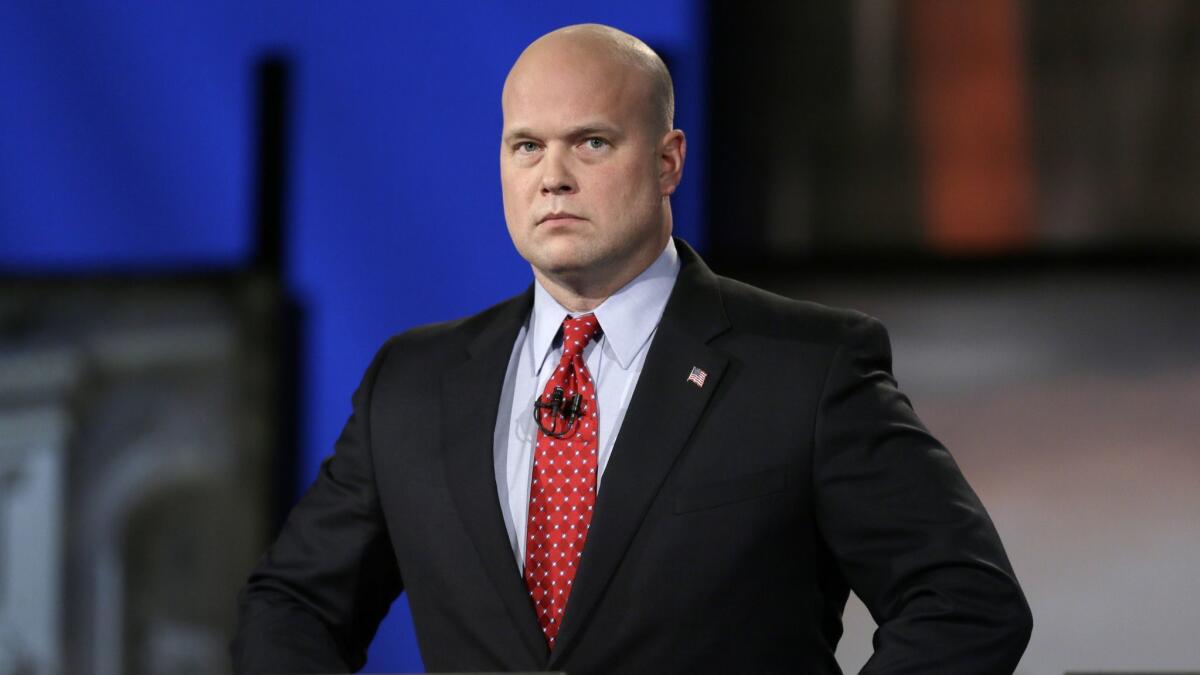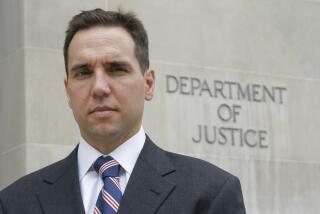Acting Atty. Gen. Matt Whitaker said to have no plans to recuse himself from Russia probe

- Share via
Acting Atty. Gen. Matt Whitaker has no intention of recusing himself from overseeing the special counsel probe of Russian interference in the 2016 election, according to people close to him who added they do not believe he would approve any subpoena of President Trump as part of that investigation.
Since stepping into his new role on Wednesday, Whitaker has faced questions — principally from Democrats — about whether he should recuse himself from the Russia investigation, given that he has written opinion pieces in the past about the investigation and is a friend and political ally of a witness.
On Thursday, two people close to Whitaker said he has no intention of taking himself off the Russia case.
Ethics officials at the Justice Department are likely to review his past work to see if he has any financial or personal conflicts. In many instances, that office does not require a Justice Department official to recuse, but suggests a course of action. In the past, senior Justice Department officials have tended to follow such advice, but they are rarely actually ordered to do so, according to officials familiar with the process.
A Justice Department spokeswoman declined to comment. Department officials have said Whitaker will follow the regular procedure in handling any ethics issues that arise.
The two people close to Whitaker also said they strongly believe that he would not approve any request from special counsel Robert S. Mueller III to subpoena the president. Mueller and Trump’s lawyers have negotiated for months about a possible interview, with no agreement in sight.
Whitaker’s elevation to become the nation’s top law enforcement official followed the ouster Wednesday of Jeff Sessions as attorney general. Sessions had endured months of public abuse from Trump, who soured on Sessions because he recused himself from oversight of the Russia investigation shortly after he arrived at the Justice Department.
Sessions felt that Mueller’s investigation had gone on too long, but also believed it was important that he stay in the attorney general’s job as a means of protecting the special counsel’s work so that, when it was concluded, the public would have confidence that it had not been manipulated, according to a person familiar with his thinking.
Whitaker harbors frustrations about the length of the special counsel’s probe and doubts about the scope of Mueller’s authority, a person familiar with the matter said. He has also questioned Deputy Atty. Gen. Rod Rosenstein’s authority to give Mueller such wide latitude. Whitaker does, however, believe that Sessions had no choice but to recuse himself from the matter, the person said.
While Whitaker is now Mueller’s ultimate supervisor, it was not immediately clear whether Rosenstein would step aside. Justice Department officials said the deputy attorney general would normally play an active, hands-on role in overseeing such a high-profile probe, and they had no reason to believe that Rosenstein would be cut out now.
Whitaker was virtually unknown to Sessions before becoming his chief of staff. A person familiar with the matter said he got on the White House’s radar via conservative circles in Iowa, his TV appearances and his connections with the Federalist Society and other conservative groups. When Sessions’s previous chief of staff, Jody Hunt, was departing, Sessions brought Whitaker in for an interview and came to like him, the person said. Another person said that remained true ever after Whitaker took his place.
Whitaker was a hard-charging top aide to Sessions, imposing on the Justice Department his personal philosophy of starting with the end goal in mind. His style rubbed many the wrong way, and at times Justice Department officials pushed back on his demands. Department officials said his taking over for his boss was, at the very least, “awkward,” because chiefs of staff typically leave with the attorney general.
Barrett, Zapotosky and Dawsey write for the Washington Post.
More to Read
Get the L.A. Times Politics newsletter
Deeply reported insights into legislation, politics and policy from Sacramento, Washington and beyond. In your inbox twice per week.
You may occasionally receive promotional content from the Los Angeles Times.










